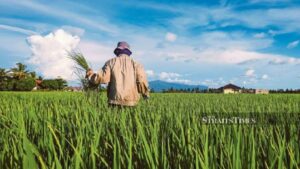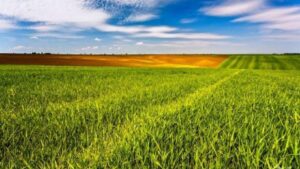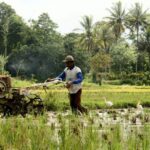Julukan Indonesia Karena Bidang Pertaniannya
As I dive into exploring Indonesia’s agricultural landscape Julukan Indonesia Karena Bidang Pertaniannya, it becomes evident that the country boasts a rich tapestry of farming practices deeply intertwined with its cultural heritage. The diverse array of agricultural products cultivated across the archipelago reflects Indonesia’s status as 
One cannot overlook the significance of agriculture in shaping Indonesia’s identity, earning it well-deserved nicknames related to its agricultural sector Julukan Indonesia Karena Bidang Pertaniannya. From being known as the “Emerald Equator” due to its lush green landscapes to being referred to as the Spice Islands for its historical role in the spice trade, these monikers highlight the country’s profound connection to the land and its bountiful harvests.
Exploring further, one uncovers how Indonesia’s agricultural nicknames Julukan Indonesia Karena Bidang Pertaniannya serve as a testament to its resourcefulness and productivity in cultivating a wide range of crops. The blend of traditional farming methods with modern techniques not only sustains livelihoods but also positions Indonesia as a key player in global agriculture, showcasing a harmonious blend of tradition and innovation.
Historical Background of Indonesia’s Agriculture
Indonesia has a rich history deeply rooted in agriculture Julukan Indonesia Karena Bidang Pertaniannya, shaping its economy and culture over centuries. The agricultural landscape of Indonesia is diverse, with various regions specializing in different crops and farming practices.
Early Agricultural Practices
In ancient times,Julukan Indonesia Karena Bidang Pertaniannya Indonesian communities practiced subsistence 
Influence of Colonialism
During the colonial period, particularly under Dutch rule, Indonesia’s agriculture underwent significant changes. Cash crops like coffee, tea, rubber, and sugar became prominent exports to meet global demand. Plantations were established across the archipelago, transforming the agricultural sector.
 Modernization and Challenges
Modernization and Challenges
In the post-independence era, Indonesia focused on modernizing its agriculture to boost productivity and food security. Government initiatives introduced new technologies, irrigation systems, and crop varieties to enhance yields. However, challenges such as land degradation, climate change impacts, and market fluctuations persist.
Current Landscape
Today, Indonesia remains a major player in global agriculture production. It is one of the world’s top producers of palm oil, rubber, cocoa, and spices. Smallholder farmers continue to play a crucial role in sustaining the country’s agricultural output while efforts are made towards sustainable practices for long-term viability.
Importance of Agriculture in Indonesia
As I delve into the significance of agriculture in Indonesia Julukan Indonesia Karena Bidang Pertaniannya, it becomes evident that this sector plays a CRUCIAL role in the country’s economy and society. Let’s explore why agriculture holds such importance:
Contribution to Economy
- Agriculture is a MAJOR contributor to Indonesia’s GDP, providing employment for MILLIONS of people across the archipelago.
- With diverse crops like rice, palm oil, rubber, and coffee, Indonesia stands as one of the world’s leading agricultural producers.
Food Security
- The agricultural sector not only fuels the economy but also ensures FOOD SECURITY for the nation by producing staple crops consumed by millions daily.
- Traditional farming methods coexist with modern practices to meet domestic demands and maintain self-sufficiency.
Environmental Impact
- However, rapid expansion in agriculture has led to environmental challenges like deforestation and biodiversity loss.
- Sustainable farming practices are being promoted to balance economic growth with ENVIRONMENTAL CONSERVATION.
Rural Development
- Agriculture remains a LIFELINE for rural communities, shaping their way of life and providing livelihood opportunities.
- Government initiatives aim to empower farmers through technology adoption and access to markets for fair trade practices.
In essence, agriculture forms Julukan Indonesia Karena Bidang Pertaniannya the BACKBONE of Indonesia’s prosperity while navigating challenges posed by globalization and sustainability. Balancing productivity with 
Throughout this article, we’ve delved into the various nicknames that Indonesia has earned due to its agricultural sector. From the Emerald Equator highlighting its lush greenery to being referred to as the “Spice Islands” for its rich spice trade history, Indonesia’s agricultural significance is deeply ingrained in its culture and economy.
The diverse range of crops grown across the archipelago showcases Indonesia’s agricultural prowess. With staple foods like rice, palm oil plantations contributing significantly to the global market, and a variety of tropical fruits thriving in its fertile lands, Indonesia continues to be a key player in the agriculture industry.
Moreover, Indonesia’s unique geography and climate have allowed it to become one of the world’s top producers of commodities such as coffee, cocoa, and rubber. This not only boosts the country’s economy but also solidifies its reputation as an agricultural powerhouse on an international scale.
In conclusion, Indonesia’s moniker as the Garden of the Equator truly encapsulates its essence as a nation abundant in natural resources and agricultural bounty. The country’s rich soil, favorable climate conditions, and centuries-old farming traditions have shaped it into a vibrant tapestry of flavors and fragrances that contribute significantly to both local livelihoods and global markets.



 Modernization and Challenges
Modernization and Challenges




















































































